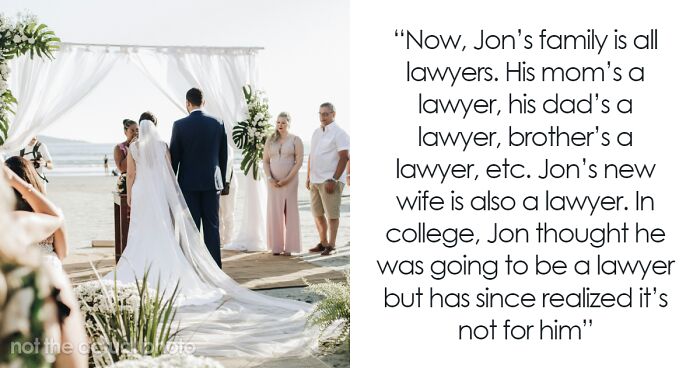
“All Of The Wannabes”: Groom’s Parents Deliver The Most Insulting Speech, Think It’s Funny
Weddings are supposedly among the happiest moments of a person’s life. They’re a special occasion shared with friends, family, and the person they intend to spend the rest of their days with.
But not all ceremonies are beautiful tearjerkers. There are disastrous exceptions, much like today’s story courtesy of Reddit user honey-smile. It was their firsthand account involving the groom named Jon, who had to sit through an insulting speech from his own parents. To make matters worse, the old couple also made rude remarks to some of the guests.
It can be difficult to have sharp-tongued parents
Image credits: Getúlio Moraes (not the actual image)
In this story, the groom endured harsh words from both his mother and father during his big day
Image credits: oneinchpunchphotos (not the actual image)
Such behavior from parents can be greatly damaging, experts say
It’s not clear whether or not the groom went through the same cycle of verbal attacks from his folks when he was young. But as pointed out by New York-based psychologist Dr. Asa Don Brown, a parent’s constant belittling of their children can be as damaging as physical or sexual abuse.
What’s more problematic is that the damages caused by such harsh treatment aren’t easily seen.
“But, with no bruises to spot, pediatricians, teachers, and family members may have trouble recognizing these and other forms of psychological abuse,” he wrote in an article for the Canadian Counselling and Psychotherapy Association.
“Not only are there no obvious physical scars, there is no universally agreed-upon definition of what constitutes psychological maltreatment of children, and a fine line can exist between not-so-great parenting and outright abuse.”
Dr. Brown also reiterated the importance of immediate care for a child who had endured a lot of chastising from their parents and the potential consequences if not taken care of.
“The urgency for aid is crucial to the child’s recovery. If you avoid seeking out aid, the child may harbor resentment. Likewise, the type of aid may, and will vary, depending upon the type, frequency, longevity, and the overall duration of the event.”
Image credits: Mario Schafer (not the actual image)
Emotional abuse from parents carries over until later in life
There’s a chance that the groom in this story could carry any resentment he may have harbored into his later years of life. A few people shared their stories with author Peg Streep, who published them in Psychology Today. Many of them were already in their mid-life at the time the article came out.
A 43-year-old woman named Becca shared her experience dealing with a “bully” and “control freak” father and a mother who “staunchly” defended his actions. According to her account, her mother considered her father’s put-downs as “a way of keeping us from getting too full of ourselves.”
“It has taken me years to really understand that loving someone doesn’t require you to lose your soul and that how she treated me was about her, not me. I still have trouble trusting people and feeling safe,” Becca said.
Others experience their parents’ resentment for their existence. As a woman named Julia explained, her birth “was the cause of all hardship and strife.”
“That was the family story, and they have never deviated from it, not in 50 years. I am still the source of all their disappointments, large and small, and that is part of their bond. In a weird way, their marriage has thrived, because they had someone to blame for their occasional unhappiness from the very start.”
Image credits: Andrea Piacquadio (not the actual image)
The speech concluded with a compliment (sort of)
Image credits: honey-smile
The original poster shared more details for added context, but most commenters felt bad for the groom
Being a lawyer is overrated. I can get a lawyer at the drop of a hat, but if I need a carpenter or plumber, I have to wait for at least 5 days!
5 days? Sweet summer child, it’s going to be about a month.
Load More Replies...My older brother tried that for his second wedding. Had the wedding halfway across the US and my adoptive mom still managed to take over the entire wedding. It was a such a s**t show as could be.
Load More Replies...I am spitballing here and not defending anyone but I bet the father had the speech written for him and it was supposed to be funny. Lawyers are known for their dry sense of humor and they think they are smarter than the rest of us so "dad" probably had a bunch of pithy jabs mixed in with a little bit of good wishes. Still passive-aggressive and mean but I am sure the dad thought it was all in good fun.
For real. I know a couple of lawyers who manage to be so clueless and amazingly petty a******s, they are actually fun to be around. Sort of like live entertainment. But I'm sure glad we aren't related. All their kids are in therapy.
Load More Replies...Being a lawyer is overrated. I can get a lawyer at the drop of a hat, but if I need a carpenter or plumber, I have to wait for at least 5 days!
5 days? Sweet summer child, it’s going to be about a month.
Load More Replies...My older brother tried that for his second wedding. Had the wedding halfway across the US and my adoptive mom still managed to take over the entire wedding. It was a such a s**t show as could be.
Load More Replies...I am spitballing here and not defending anyone but I bet the father had the speech written for him and it was supposed to be funny. Lawyers are known for their dry sense of humor and they think they are smarter than the rest of us so "dad" probably had a bunch of pithy jabs mixed in with a little bit of good wishes. Still passive-aggressive and mean but I am sure the dad thought it was all in good fun.
For real. I know a couple of lawyers who manage to be so clueless and amazingly petty a******s, they are actually fun to be around. Sort of like live entertainment. But I'm sure glad we aren't related. All their kids are in therapy.
Load More Replies...
 Dark Mode
Dark Mode 

 No fees, cancel anytime
No fees, cancel anytime 






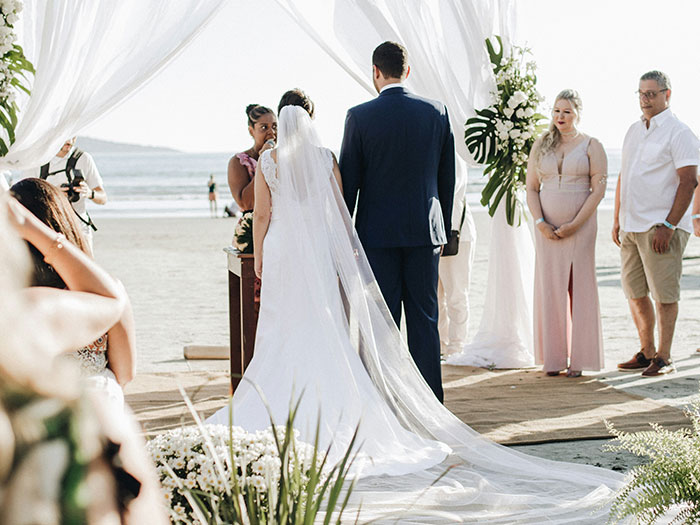
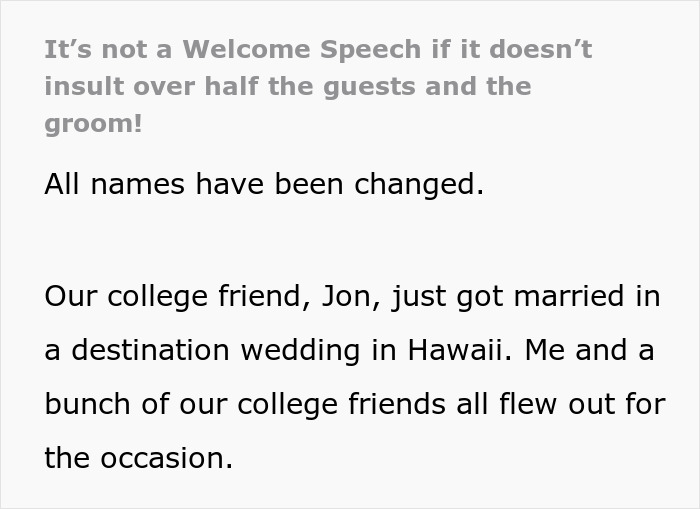
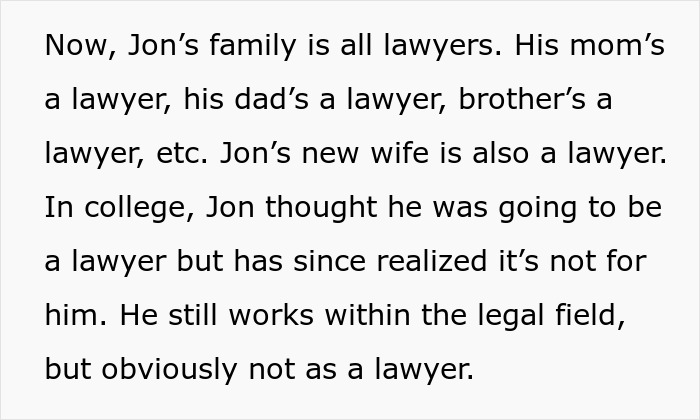
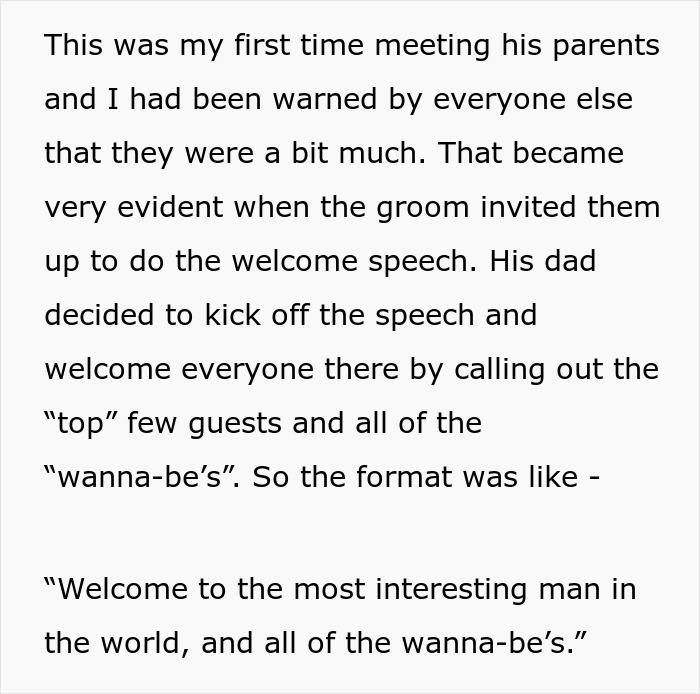


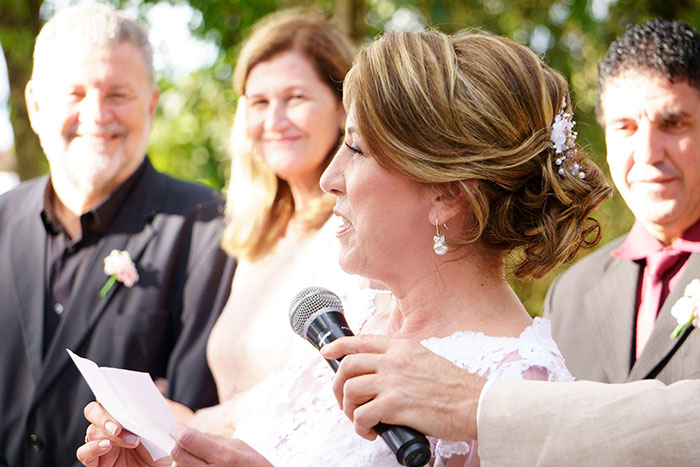

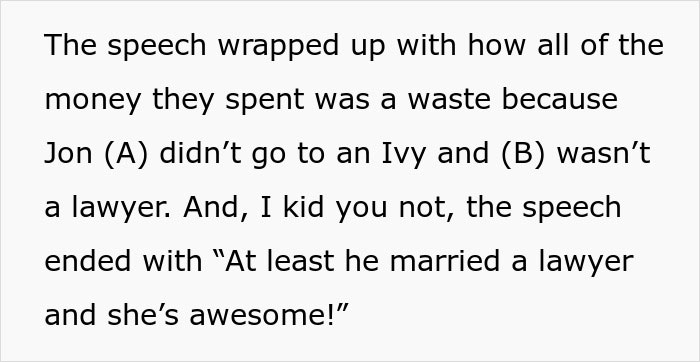

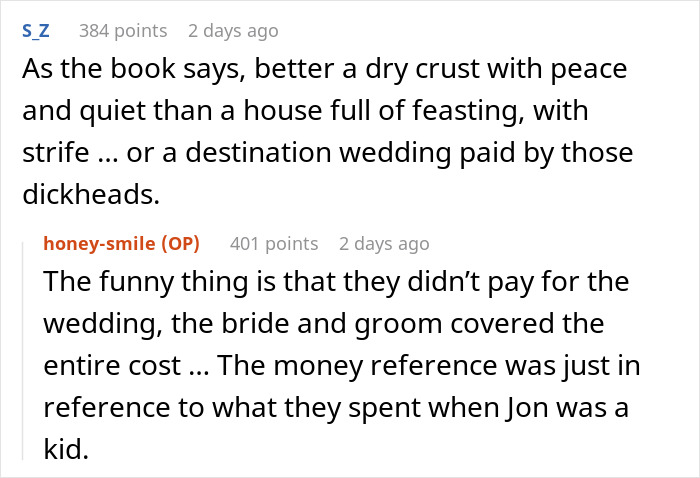
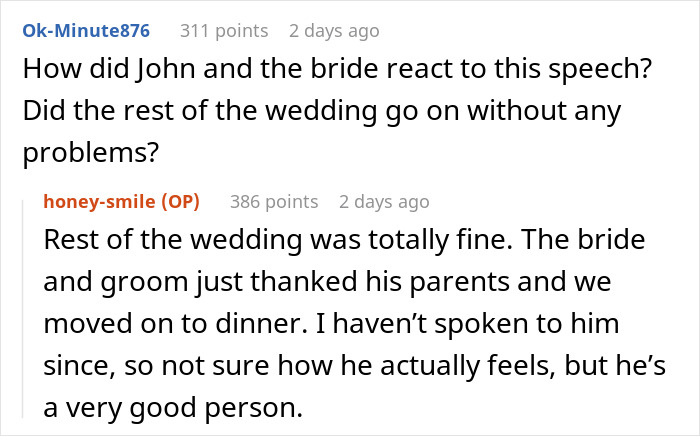
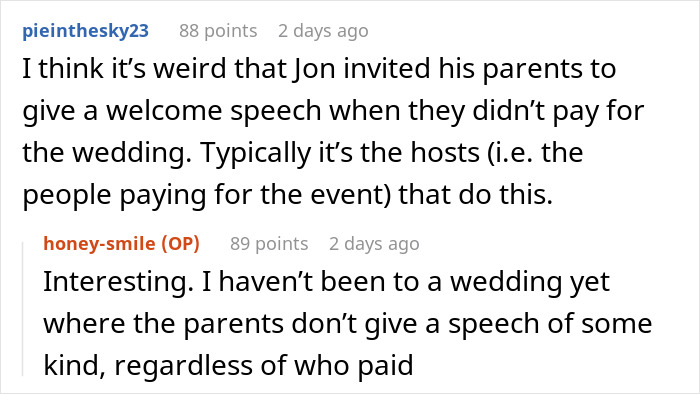






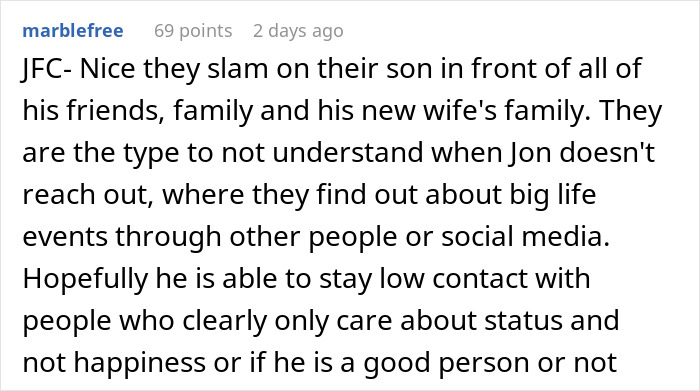



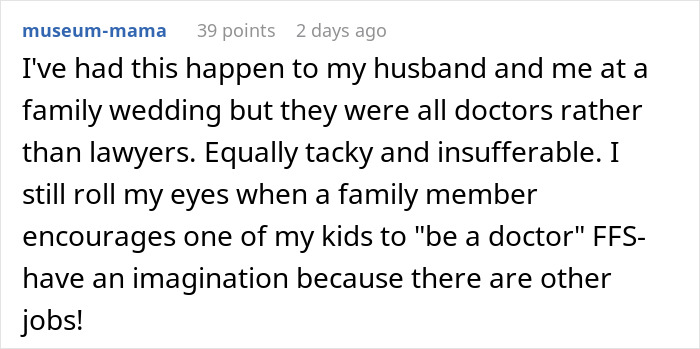













































24
15